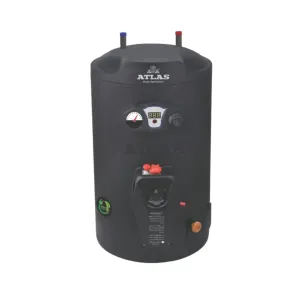Hybrid geysers, also known as electric+gas water heaters, combine the power of both electricity and gas to provide reliable hot water even during power outages or gas shortages. These innovative appliances feature dual heating elements—an electric coil and a gas burner—allowing Hybrid Geyser Electric+Gas users to switch seamlessly between energy sources based on availability and cost. By integrating storage tank technology with on-demand heating capabilities, hybrid geysers ensure consistent hot water supply for showers, washing, and household needs, making them ideal for regions like Pakistan with frequent utility disruptions.
Working Principle
Hybrid geysers operate on a straightforward yet efficient principle. Cold water enters through an inlet pipe into an insulated inner tank, typically made of rust-resistant materials like stainless steel or vitreous enamel with a sacrificial anode for corrosion protection. A thermostat monitors the water temperature and activates the primary heating source—electric by default—using heating elements to raise it to the set level, often between 60-75°C. When electricity fails, users manually or automatically switch to the gas mode, where a burner ignites upon water flow detection, heating the water via a heat exchanger without needing constant gas supply.
In gas mode, sensors detect water pressure and flow, igniting the flame only when hot water is demanded, similar to tankless systems, which minimizes standby losses. The tank's polyurethane foam (PUF) insulation retains heat for hours, reducing reheating cycles. Safety features like overheat cutoffs, dry-heat protection, and flame failure devices prevent accidents, while pressure relief valves handle excess buildup. This dual-system design recovers heat efficiently, blending storage reliability with instant heating precision.
Key Features and Specifications
Hybrid geysers come in capacities from 20 to 100 liters, suiting small apartments to large families. Electric elements range from 1500-3000W for rapid heating, while gas burners use LPG or natural gas at 3-6 kW output. Advanced models include digital displays for temperature control, remote switches for mode selection, and ECO modes that prioritize the cheaper fuel source. Multi-point connectivity allows installation for multiple bathrooms, and some feature induction heating for faster, uniform warmth.
Quiet operation, anti-scald technology, and child locks enhance usability. Energy ratings like 5-star efficiency ensure low consumption—electric mode uses about 2-3 units per hour, gas mode saves up to 60% compared to pure electric geysers. Installation requires proper venting for gas exhaust and electrical wiring compliant with local standards.
Advantages Over Traditional Geysers
The primary benefit is uninterrupted hot water supply; during loadshedding, gas takes over instantly, avoiding cold showers. Cost savings are significant—gas is cheaper in many areas, reducing bills by 40-50% versus all-electric models. They offer superior energy efficiency by minimizing standby losses through on-demand gas firing and superior insulation. Environmentally, they lower carbon footprints when using efficient gas combustion.
Durability extends up to 10-15 years with proper maintenance, outperforming single-fuel units. Versatility suits varying climates—electric for mild needs, gas for high demand. Initial costs are higher (PKR 20,000-60,000), but long-term savings justify the investment, especially in urban homes with unreliable power.
Maintenance and Safety Tips
Routine care involves flushing sediment annually, checking the anode rod every 2 years, and cleaning gas burners to prevent soot buildup. Use filtered water to avoid scale on elements, and inspect seals for leaks. Professional servicing ensures gas line safety and electrical integrity. Always follow manufacturer guidelines for fuel transitions to avoid inefficiencies.
Ideal Applications
Hybrid geysers excel in households facing energy volatility, hotels, or offices needing constant hot water. For Pakistani winters, models like Glam Gas hybrids provide robust performance. They balance convenience, economy, and reliability, transforming daily routines with dependable warmth.
In essence, hybrid electric+gas geysers represent smart engineering, delivering hot water resilience against power or gas disruptions while optimizing costs and efficiency for modern living.

